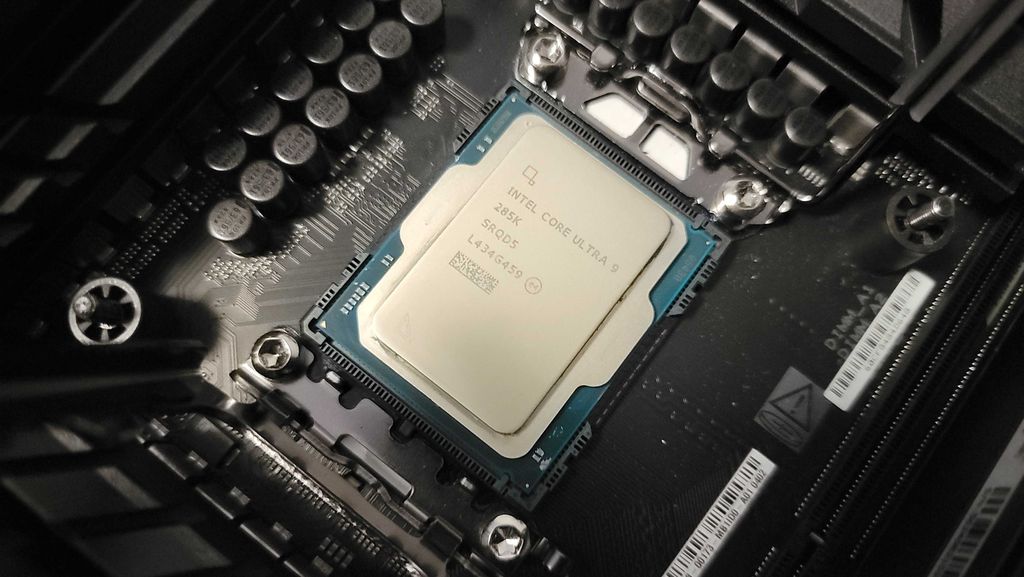
(Image credit: Tom's Hardware)
Latency issues surrounding Intel's Core 200S series CPUs affect M.2 storage ports on LGA 1851 motherboards, leading to reduced performance. The SSD review reports that Arrow Lake CPUs have a bottleneck on the PCIe lanes dedicated to motherboard M.2 slots, causing a (roughly) 2GB/s bandwidth reduction compared to previous-gen motherboards when using the fastest and Best SSDs available.
The storage-focused review outlet initially discovered the flaw during testing when a 14GB/s-capable PCIe 5.0 SSD only achieved 12GB/s in an Arrow-Lake-based test rig. After reaching out to board makers and Intel, it was found that the issue is Arrow Lake-specific. The review outlet has been unable to confirm any Z890 motherboards operating PCIe 5.0 SSDs at speeds beyond 14GB/s, whereas previous-gen Z790 boards have no problem hitting the maximum speeds.
The review outlet demonstrated the aforementioned issues with a Samsung 9100 Pro and Micron 4600 SSD paired to two systems running a Z890 (Arrow Lake) and a Z790 (Raptor Lake) motherboard. With the Z890 motherboard, the Samsung and Micron SSDs peaked at 12.3GB/s in the board's primary and secondary M.2 slots.
Both SSDs reached speeds of up to 14.3GB/s on the Z790 motherboard. Furthermore, the review outlet tested both SSDs on an Asus Hyper M.2 add-in PCIe card and found both drives could achieve 14.3GB/s as well, confirming the issue only affects bandwidth on the physical M.2 slots on Z890 motherboards. Although sequential read/write performance improved, random performance remained behind the levels observed on older Z790 motherboards, indicating the latency issue persists even when bypassing the M.2 slot.
Further analysis confirmed that such performance limitations were not isolated to any specific motherboard maker. Asus and ASRock replicated the results independently and explained that the issue originates from the latency introduced by the I/O Extender component in Intel's new multi-chip processor layout.
This bizarre performance issue is allegedly a problem with Intel's interconnect on its latest Arrow Lake-based processors, resulting in unusual latency behavior among the chip's PCIe lanes. Intel's Core Ultra 200S-series processors for desktops feature 24 PCIe lanes: 16 PCIe 5.0 lanes for add-in graphics cards, four PCIe 5.0 lanes for SSD, and four PCIe 4.0 lanes for SSD. The first 16 PCIe lanes are controlled directly by the SoC tile of Intel's Arrow Lake-S CPUs. However, PCIe lanes 21 through 24 are routed through the I/O Extender tile, which adds latency and lowers peak bandwidth.
"Intel can confirm that the PCIe lanes 21 to 24 PCI Gen5 root port on Intel Core Ultra 200S series processors may exhibit increased latencies compared to the PCIe lanes 1 to 16 Gen5 root ports, owing to a longer die-to-die data path," a statement by Intel published by SSDReview reads. "However, any variations are contingent upon the specific workload and the capabilities of the PCIe endpoint device."
This is now the second major performance-related issue affecting Arrow Lake processors. Intel's transition from a monolithic die design to a chiplet-style architecture with Arrow Lake has been widely known to affect gaming performance compared to previous generations of Intel processors. For instance, we've found that Intel's previous generation Core i9-13900K and i9-14900K flagships are significantly faster than the Core Ultra 9 285K gaming workload on average (based on our review of the Core Ultra 9 chip).
Intel has provided a firmware update(s) since our review to help alleviate gaming performance, but even with these updates, the chips still struggle to compete against previous-gen Raptor Lake predecessors in gaming scenarios.
Now that NVMe-based storage drives are having similar issues, it appears Intel's firmware development team has more work to do to rectify Arrow Lake's performance regressions, primarily caused by the architecture's switch to a chiplet-style design. It doesn't appear that Intel can fix these issues with firmware, so we'll likely have to wait for Intel's next-generation parts before these issues get fixed.
Follow Tom's Hardware on Google News to get our up-to-date news, analysis, and reviews in your feeds. Make sure to click the Follow button.

-
 C114 Communication Network
C114 Communication Network -
 Communication Home
Communication Home


